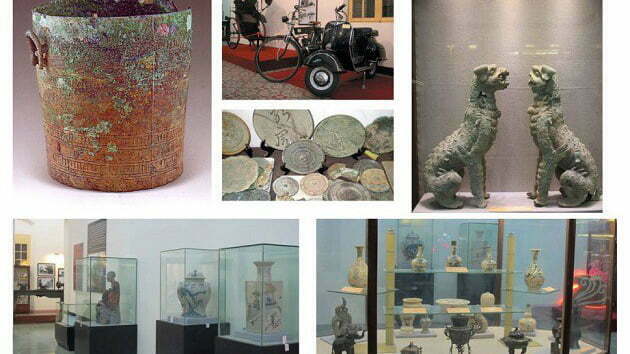The Hai Phong Museum was the first local museum established in Vietnam. It was built in 1919 on 1 ha covered with large old trees in what is today Hai Phong City center. Set in a superb colonial mansion, the Hai Phong Museum holds a small but impressive collection of local historical artifacts which trace the heritage of the region as well as a selection of precious gems, traditional items, and old photographs.
In Gothic-style room in the Hai Phong museum, a group of students from Hong Bang secondary school are having an extracurricular lesson. After exploring Hai Phong’s geography, natural resources, culture and history through the pictures and artifacts on display, the students took turns as museum tour guides. Nguyễn Hoàng Phương Uyên, a 7th grade student at Hong Bang secondary school, told VOV: “This is the first time I’ve taken part in such an interesting activity and I’m glad to help other people to learn more about the city I’m living in. This also promotes our love for the homeland.”
Children from the Sakura Montessori kindergarten are taking a tour of the Hai Phong Museum guided by their teachers. Vũ Hải Bình, head master of the kindergarten, said: “I was very impressed during my first visit to Hai Phong museum to see so many artifacts that taught me about the place where I’m living, about the history and development of Hai Phong City. I also learned about some very old factories in the city that produce glazed aluminium products, glass, and plastic. This encouraged me to bring the kids at our kindergarten to visit this museum.”
Generations of museum employees have collected nearly 20,000 artifacts. Today’s employees receive crowds of visitors everyday. Archeological artifacts on display at the museum include items from the Cai Beo and Trang Kenh sites that date back 7000 years.
According to Nguyễn Văn Phương, the museum’s director, displays are organized to give visitors a clearer view of the different historical periods and the unique cultural characteristics of different localities. Nguyen Van Phuong told VOV: “We hope to give younger generations access to valuable documents and items that highlight the struggle of people in Hai Phong atthe very beginning of Vietnam’s resistance war against the French colonialists. This will boost the youngsters’ pride of their city and encourage them to contribute to the city’s development.”




